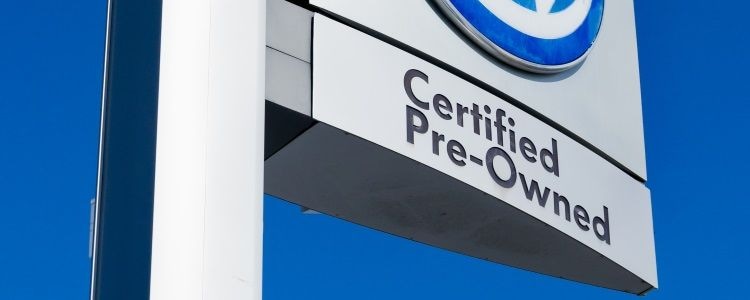When you need a used car, certified pre-owned (CPO) vehicles are often considered the cream of the crop. But are they worth the extra cost over an as-is, non-certified car?
When you're shopping for a used car, especially now with vehicle prices climbing, it's important to look for a reliable vehicle that meets your needs, and your budget.
Oftentimes, this drives people to lower-priced used cars, but these vehicles may not be as reliable as you'd like. To really go for the next best thing to new when you're on a budget, start by looking for a certified pre-owned vehicle, or CPO.
What's a CPO vehicle? CPO cars tend to be newer vehicles with strict mileage requirements, which often make them a better candidate in the safety department than a standard used car. However, it does mean that certified used vehicles cost more. Just how much more depends on the car, and whether or not it's worth it may depend on your situation.
CPOs are inspected by a manufacturer-certified mechanic, refurbished to their best possible condition, and come with some form of a manufacturer-backed warranty. These vehicles are typically no more than five or six years old and usually need to have less than 80,000 miles on them, though this varies by automaker. Some manufacturers only allow a limit of 60,000 miles, and some extend up to 100,000. Only franchised dealerships can offer true CPOs.
What's included with CPO cars? To give you an idea of how a CPO may be more valuable than a standard used car, here are a few program examples and what they include:
- Audi – Audi CPO vehicles are put through a rigorous 182-point inspection. CPOs must be six model years old or newer and have less than 80,000 miles on them. All-new Audi's come with a five-year/unlimited mileage warranty, and you get whatever portion of that remains when you purchase the CPO. After the new-car warranty runs out, or at the start of your purchase if it's already expired, you get a 12-month warranty with no mileage cap. Audi also includes 24-hour roadside assistance, emergency towing, and Audi Assist for CPO buyers. There is no deductible for service when you're covered under this warranty.
- Ford – With Ford's Blue Advantage program, CPOs undergo a 172-point inspection and must be no more than 6 model years old with less than 80,000 miles on them. CPOs are covered under a 7-year/100,000-mile limited powertrain warranty from the original date of sale. There is also a 12-month, 12,000-mile comprehensive limited warranty, 24/7 roadside assistance, and 22,000 FordPass reward points to put toward your first two scheduled maintenance visits. Service deductibles are $100 for covered expenses.
- General Motors – All Chevy, Buick, and GMC models undergo a 172-point inspection before becoming a CPO. Vehicles must be 6 model years old or newer, have less than 75,000 miles, and have no open recalls. These cars all receive a 6-year/100,000-mile powertrain warranty from the original sale date, and come with an additional 12-month/12,000-mile bumper-to-bumper warranty from the date you purchase, or after the original warranty runs out. 24/7 roadside assistance is included until the powertrain warranty runs out. CPOs also include a three-month trial of SiriusXM and one month of OnStar.
The above perks don't come with non-certified used cars, which are sold as-is with no age or mileage restrictions. Warranties aren't included with as-is used vehicles and need to be purchased separately.
 Pros and cons of certified used cars. CPO cars, like any used vehicle, come with pros and cons. The cost to you, the vehicle you buy, and what's included with the CPO package all determine the price you pay for a certified used car. Use these points to help you determine if a CPO car is worth it for you:
Pros and cons of certified used cars. CPO cars, like any used vehicle, come with pros and cons. The cost to you, the vehicle you buy, and what's included with the CPO package all determine the price you pay for a certified used car. Use these points to help you determine if a CPO car is worth it for you:
Pros:
- A better vehicle to start. Since certified pre-owned vehicles are typically newer than their non-certified counterparts, they may be a better car from the start. Standard used cars don't often have age or mileage limitations, but CPOs have to adhere to strict manufacturer guidelines. And, newer vehicles often offer a greater suite of safety and technology features than their older used siblings.
- Savings down the road. Added to the inherent perks of a newer car with fewer miles is a manufacturer-backed warranty, typically featuring comprehensive coverage and/or powertrain warranties. With manufacturer-backed coverage, you can typically take your car to any franchised dealership for service or repair.
- May qualify for financing deals. Unlike standard used cars, some CPOs are eligible for financing incentives or rebates from captive lenders. Not all borrowers qualify for these deals, so be sure to check with the dealer for details.
- Peace of mind. Perhaps the biggest perk of a CPO is peace of mind, not having to worry about any future repairs for as long as they're covered. Usually, if there's any remaining factory warranty coverage on a CPO vehicle, the extended warranty is tacked on to the end, otherwise, coverage of your CPOs warranty starts when you purchase the car.
Cons:
- Higher costs upfront. Though a CPO may not cost you as much to repair down the road, the initial price is typically higher than its non-certified counterparts. This is often because you're getting a newer, more well-maintained vehicle.
Is it worth it? Certified pre-owned vehicles can often cost thousands more than their non-certified siblings – anywhere from $850 to $3,000 more on average, according to Consumer Reports. To determine if this extra cost is worth it, you can compare prices between a CPO and a similar non-certified model, and then add in the cost of an extended warranty, and other perks which you can purchase separately.
Of course, there's no guarantee that any used car will last forever, so outside of the apples-to-apples comparison, it's up to you to decide how much peace of mind is worth to you.
When you're ready to search for your next car, CPO or otherwise, we want to help. Here at Auto Credit Express, we work with a nationwide network of special finance dealerships that can help you get into the vehicle you need. To find a dealer in your area, just fill out our fast, free, auto loan request form.
















